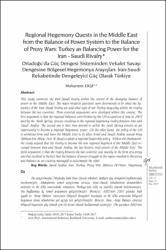| dc.contributor.author | Ekşi, Muharrem | |
| dc.date | 2019-06-25 | |
| dc.date.accessioned | 2019-06-26T06:27:38Z | |
| dc.date.available | 2019-06-26T06:27:38Z | |
| dc.date.issued | 2017-12-15 | |
| dc.identifier.citation | Ekşi, M., (2017). "Regional Hegemony Quests in the Middle East from the Balance of Power System to the Balance of Proxy Wars: Turkey as Balancing Power for the Iran - Saudi Rivalry", Gazi Akademik Bakış, ESCI, Cilt 11, Sayı 21, Kış 2017, ss. 133-156. | |
| dc.identifier.uri | https://dergipark.org.tr/download/article-file/405427 | |
| dc.identifier.uri | https://hdl.handle.net/20.500.11857/885 | |
| dc.description.abstract | This study examines the Iran-Saudi rivalry within the context of the changing balance of power in the Middle East. The main research questions were determined to be what the dynamics of the Iran-Saudi rivalry are and what type of role Turkey may play within the rivalry between the two countries. Three essential arguments were developed within this context. The first argument is that the regional balances were broken by the US occupation of Iraq in 2003 and by the ‘Arab Spring’ process resulting in the regional hegemony rivalry between Iran and Saudi Arabia. The second one is that Iran desired to utilize the Arab Spring process as an opportunity to become a regional hegemonic power. On the other hand, the policy of the US to withdraw from and leave the Middle East to its allies Israel and Saudi Arabia caused King Salman bin Abdul-Aziz Al Saud to adopt a regional leadership policy. Within this framework, the study argued that the rivalry to become the new regional hegemon of the Middle East resurged between Iran and Saudi Arabia, the two historic rival powers of the Middle East. The third argument is that the rivalry between the two countries was mainly in the form of a proxy war but resulted in the fact that the balance of power struggle in the region reached to the proxy war balance as no country managed to outcompete the other. | |
| dc.description.abstract | Bu araştırmada Ortadoğu’daki İran-Suudi rekabeti, değişen güç dengeleri bağlamında incelenmiştir. Makalenin temel araştırma sorusu, İran-Suudi rekabetinin dinamikleri nelerdir ve iki ülke arasındaki rekabette Türkiye’nin rolü ne olabilir olarak belirlenmiştir. Bu bağlamda üç temel argüman geliştirilmiştir: Birincisi, ABD’nin 2003 yılında Irak işgali ve ‘Arap Baharı’ sürecinin bölgesel dengeleri bozduğu ve iki ülke arasında bölgesel hegemon olma rekabetine yol açtığı tezi geliştirilmiştir. İkincisi, İran, Arap Baharı sürecini bölgesel hegemon güç olmak için bir fırsat olarak kullanmak istemiştir. Öte yandan ABD’nin bölgeden çekilmesiyle Ortadoğu’yu müttefikleri İsrail ve Suudi Arabistan’a bırakma politikası, Kral Salman’ı bölgesel liderlik politikasına yöneltmiştir. Bu çerçevede araştırmada Ortadoğu’nun iki tarihsel rakip gücü olan İran ve Suudi Arabistan arasında Ortadoğu’nun yeni bölgesel hegemonu olma rekabetinin başladığı argümanı ileri sürülmüştür. Üçüncüsü, iki ülke arasındaki rekabetin ağırlıklı olarak vekalet savaşı biçiminde yürütüldüğü, ancak her iki ülkenin de birbirlerine üstünlük sağlayamaması, bölgede güç dengesi rekabetinin aynı zamanda vekalet savaşı dengesine dönüştüğü argümanı ileri sürülmüştür. | |
| dc.language.iso | eng | |
| dc.relation.ispartof | Gazi Akademik Bakış | |
| dc.rights | info:eu-repo/semantics/openAccess | |
| dc.rights.uri | http://creativecommons.org/publicdomain/zero/1.0/ | * |
| dc.subject | Saudi Arabia | |
| dc.subject | Iran | |
| dc.subject | Turkey | |
| dc.subject | Proxy War | |
| dc.subject | Balance Of Power | |
| dc.subject | Hegemony | |
| dc.subject | Suudi Arabistan | |
| dc.subject | İran | |
| dc.subject | Türkiye | |
| dc.subject | Vekalet Savaşı | |
| dc.subject | Güç Dengesi | |
| dc.subject | Hegemonya | |
| dc.title | Regional Hegemony Quests in the Middle East from the Balance of Power System to the Balance of Proxy Wars: Turkey as Balancing Power for the Iran - Saudi Rivalry | |
| dc.title.alternative | Ortadoğu’da Güç Dengesi Sisteminden Vekalet Savaşı Dengesine Bölgesel Hegemonya Arayışları: İran-Suudi Rekabetinde Dengeleyici Güç Olarak Türkiye | |
| dc.type | article | |
| dc.department | Fakülteler, İktisadi ve İdari Bilimler Fakültesi, Uluslararası İlişkiler Bölümü | |
| dc.relation.publicationcategory | [Belirlenecek] | |
| dc.institutionauthor | Ekşi, Muharrem | |





















